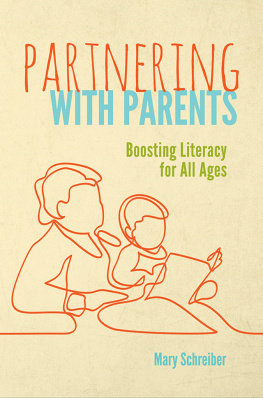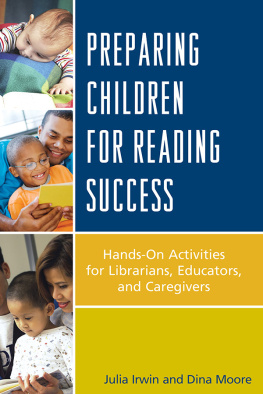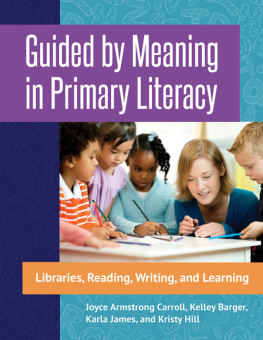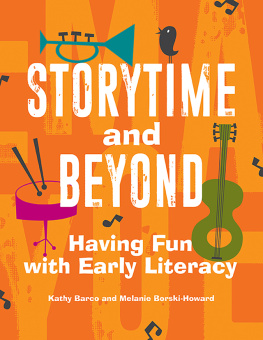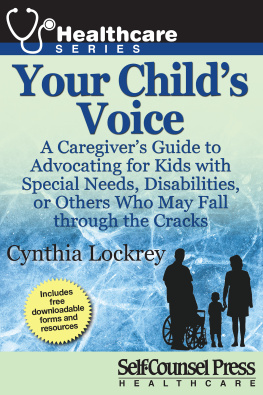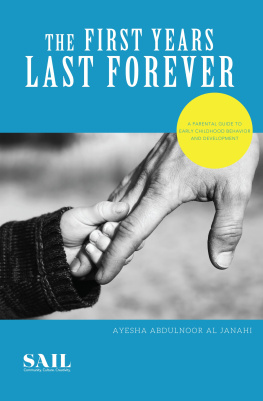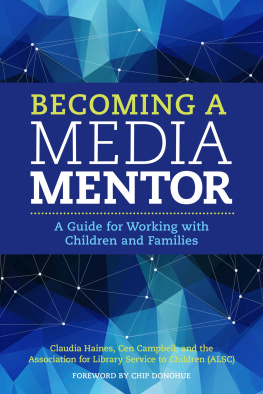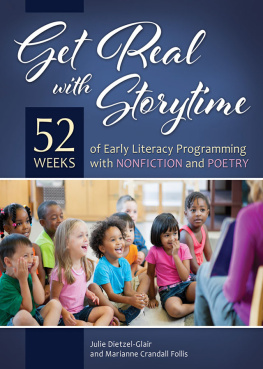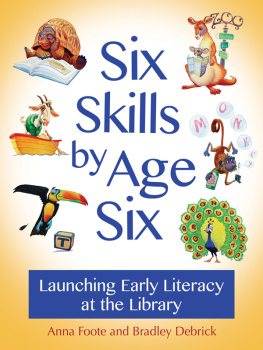All rights reserved. No part of this publication may be reproduced, stored in a retrieval system, or transmitted, in any form or by any means, electronic, mechanical, photocopying, recording, or otherwise, except for the inclusion of brief quotations in a review, without prior permission in writing from the publisher.
Names: Schreiber, Mary, author.
Title: Partnering with parents : boosting literacy for all ages / Mary Schreiber.
Description: Santa Barbara, California : Libraries Unlimited, an Imprint of ABC-CLIO, LLC, [2019] | Includes bibliographical references and index.
Identifiers: LCCN 2019006538 (print) | LCCN 2019008244 (ebook) | ISBN 9781440863936 (ebook) | ISBN 9781440863929 (paperback : acid-free paper)
Subjects: LCSH: ChildrenBooks and reading. | ReadingParent participation.
Classification: LCC LB1050 (ebook) | LCC LB1050 .S287 2019 (print) | DDC 649/.58dc23
LC record available at https://lccn.loc.gov/2019006538
This book is also available as an ebook.
I would like to acknowledge all of the libraries, and their staff, who were willing to share the inspiring work that they do. Your talents will help others expand their efforts to help parents and children discover the magic of reading. I would not have a book without you.
A big thank-you to Wendy Bartlett, for encouraging me to write this book. You were wonderful about cheering me on, keeping me focused, and answering my questions about the publishing process.
A special thank-you to my mother, Gayle Schreiber. As a retired educator and school librarian, with over 30 years of experience, you have shared your wisdom and knowledge about literacy and the learning-to-read process with me my whole life. You truly were my first teacher and I am still learning from you every day. Thanks for being the first reader of Partnering with Parents.
If you have picked up this book, you are hopefully looking for ways to expand the collections, programs, and services for families that you offer in your public or school library. My goal in writing this book is to give you the tools you need to provide even better support to the parents and children you serve.
You will not become a reading teacher from reading this book, but after reading, you should have a better understanding of the challenges both parents and children experience on the path to being independent readers. You may or may not remember this process from your own childhood. If you do remember, it might be a fond memory or it could be one you wish you could forget. No matter the experience, you came out on the other side, and now you can help the families in your community do the same.
There are a couple of words used throughout the book that I would like to further define. One word is parent or caregiver. I recognize that there are lots of adults in a childs life and they may have a huge impact on a childs reading success without necessarily having the title of mother or father. Using the word parent or caregiver is not meant to diminish the role these additional caring adults have. Both the terms parent and caregiver represent caring adults that may include foster parents, stepparents, grandparents, aunts and uncles, neighbors, friends parents, and teachers.
The other term is librarian, and it can mean anyone who is working with kids in the library. It does not necessarily need to be someone with a masters in library science degree. The programs and tips throughout this book are meant for all library workers who want to help boost literacy.
Organization
You can read this book straight through or you can go directly to the chapters that are of most interest to you. The concepts do build upon each other to a certain extent, but, depending on your current knowledge, you can skip around a little more freely.
focuses on early literacy. You will find tips to share with parents, types of books to become familiar with, and programs and services that bring the library out into the community.
delves into the importance of play. You may not think about play and literacy together, but the two really do go hand in hand. Learn about sourcing out toys and apps. Discover programs that promote play and literacy at the same time.
looks at when the reading process begins. A big piece that parents will need support around is the leveling of books. Learn how other libraries are helping parents find the right books for their child and programs that support the learning-to-read process.
removes the word struggling reader and instead focuses on the developing reader. These kids may be seen as behind the normal track for learning to read, but with the right support and encouragement from schools, libraries, and parents, they can excel.
examines the ways to encourage reluctant or apathetic readers into becoming enthusiastic readers. Find programs and book formats that can help make this happen.
looks at the school age child and how libraries can support these parents and kids by offering exciting programs that include literacy aspects beyond just reading.
asks you to examine your librarys space, collection, and programming with inclusivity in mind. Many times, you are not as diverse or inclusive as you strive to be. Taking a step back and looking at where you are and where you want to be can help you achieve your goals.
finds ways to keep parents and families engaged with reading and the library as the kids get older. Using the library together and sharing books does not have to end when kids enter middle school or even high school.
The Epilogue explains that the goal of this book is not that you will adopt every program or service discussed. Libraries are busier than ever with all the different programs and services being offered. Instead, the hope is that you will use the ideas found here as an inspiration to tweak programs you already offer or pick a couple to slowly add into your workflow. No matter what, to be a literacy expert you need to read, and you need to read lots, and you need to read widely.
Chapter One
Helping Parents Get It Right from the Beginning
Libraries have been connecting with parents and providing storytime for generations. In the early 2000s, the Public Library Association and the Association of Library Service to Children, two divisions of the American Library Association, joined together to study how to incorporate early literacy skills into workshops for caregivers and daycare providers and into traditional storytime programs that public libraries offer. As defined by the Cedar Mill Community Libraries website, Early Literacy is what children know about reading and writing before they actually read or write (Cedar Mill Community Libraries, Early Literacy 2017).

